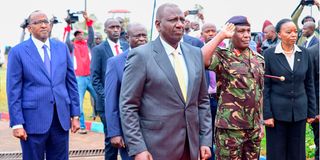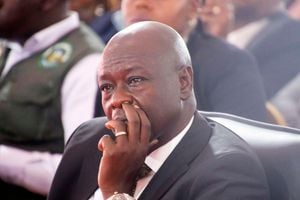Graft: Kenya’s pandemic and lessons from Meja Mwangi

President William Ruto (centre) during the flagging off of a contingent of Kenya Defence Forces soldiers to the Democratic Republic of Congo for a peacekeeping mission on November 2, 2022.
“The newcomer, a popular president, who seized or won power on a ‘down with corruption’ or ‘national salvation’ platform, pledges he will serve only the constitutional two terms and then go back to the military barracks, the lecture hall, trade union job or the commercial business he misses so much.
Soon after, he makes his first European or transatlantic trip in the presidential jet of lacquered mahogany leather interior.
By the time the $30 million Citation or Gulfstream has whisked him silently above the clouds to the presidential suite in Paris’ Crillon or New York’s Waldorf-Astoria, and after basking in the echo of his first international applause to the anodyne speech he gives at the whatever conference, and after signing that road or oil contract of which a good percentage of the cost is lodged in the secret bank account he has just opened in Zurich, His Excellency is well and truly crooked.
By the time he flies back home, he wants the jet, the limos, the gun salutes and the unlimited expense accounts to be permanent features in his life. Tokoloshe!”
These words from the book, Hello Africa: A Noble Continent in Painful Renaissance by Osei G. Kofi, describe the concept of tokoloshe (ogre) — how African presidents transform from well-intentioned people at the start of their administrations to become ugly ogres down the line as they get consumed with greed and thirst for more power.
Where is there a sadder and more solemn story of the fate of nations that make shipwreck of their economies like in Africa? Hope rises when a new regime takes over and then, after short shrift, it ends in despair as leaders become greedy — each subsequent regime becomes an occasion for regret, gnashing of teeth and a fresh round of ‘premium’ tears.
In much of Africa, politics is like the drunken uncle who embarrasses everyone at the family reunion; sometimes making the continent a rancid, cheerless place, one quite different from anything most freedom fighters rhapsodized about on their notions of the ideal continent as they fought against colonial rule.
The despair and helplessness seem to have been running through African politics for decades, leading up to the grim, apoplectic present. It is often maddening, exhausting, and a phantasmagoria of pain.
The Kenya Kwanza administration headed by President Dr William Ruto has a perfect opportunity to reverse this African “curse” of looting and greed. President Ruto has a clean slate — at the bright beginning of his reign untarnished by corruption, greed and regret.
He can hit the reset button now. The president, known for bravado and hype, has his work cut out. Kenyans, in their grim tussles with the hardships of life, have high hopes for a new direction under the Ruto administration; this hope is rising like a strong flame, white with its very ardour and quivering with intensity.
The new administration (especially as the new Cabinet Secretaries start their work) should avoid the ills illuminated in Meja Mwangi’s novel, The Big Chiefs, a spinning prism of fiction that shines not only with iridescent glints of melancholy whimsy but also real pain.
The Big Chiefs, like the earlier-mentioned Tokoloshe (ogres), are out to “eat” not for public service. Mwangi writes in his novel that one character simply named the Old Man aptly says that, “Hungry people hardly think of anything but food…”.
Solitary voice
The hungry man’s cry is a poor, thin, solitary voice; many times unheard. We may feel bad for him; we may even feel guilty about our own prosperity, our good fortune, but that won’t take away his hunger. He cannot enjoy the soft peach glow of the sunset or the flowing fluorescence of the city lights.
He could be on his bed at night but sleepless, sad, and starving — a restful moment rendered less tender by hunger pangs — drifting in and out of uneasy sleep.
There are many deliberations going on right now about increasing individual contributions to the National Social Security Fund (NSSF) and the National Hospital Insurance Fund (NHIF) but hungry people hardly hear of anything but food. And the new government would do well to remember their gloomy plight.
Mwangi writes directly in his novel about the dragon endangering the African continent: “A long time civil servant, the Old Man had been everything from Provincial Medical Officer to Chief Government Chemist to, for a short spell, a nominated member of Parliament and Health Minister.
Consequently, he had experienced more than his share of corruption. Many of his peers, leaders and civil servants alike, had become so intoxicated and addicted… and thus surrounded themselves so completely with corruption that they believed… that there was nothing at all wrong with it”.
Corruption has devastated many economies. As the Johannesburg-based journalist, Tafi Mhaka, once wrote on aljazeera.com, “The damage high-level and systemic corruption inflicts on already struggling African economies cannot be ignored or written off as normal or negligible.
The illicit activities of elected officials, bureaucrats and industry leaders are leaving states unable to deliver the most basic services to their citizens”.
President Ruto needs to strongly act now against corruption when it’s still early in his administration before the serpent of corruption grows into an untamed dragon.





